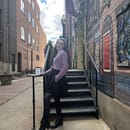When you’re a kid, everyone’s favorite question to ask you is “What do you want to be when you grow up?” I will never understand why. Anyone who is “grown up” can tell you how much simpler life was when they were a kid.
Why was everyone in our lives so eager to rush our childhood? Why did people expect 8-year-olds to be planning their future? At that age, the most important question on our minds should have been “What am I going to have for lunch today?” or “Who am I going to hang out with at recess?” But instead, we were asked about our career aspirations. Not just once, but multiple times.
I can recall many times in my childhood when a teacher or a family member asked me what I wanted to be when I grew up. My answer changed many times throughout the years, but one answer that frequently came up was “author.” As I kid, I was always coming up with characters and stories in my head. All my dolls had names and backstories. In school I was always better at English and grammar than I was math or science. And I enjoyed those subjects more as well. So being an author seemed like the best path to my young self at the time.
As I got older, however, the age-old question changed. It no longer mattered what you wanted to be when you grew up, but rather what paid the most, what was the most impressive, what other people thought you should do with your life. People wouldn’t always say these things outright, but I knew them to be true. It was drilled into my head that there were certain careers that were important, impressive, and useful, and there were others that were not. I felt like if I didn’t become a doctor or scientist of some sort, I was less important somehow. But I knew I couldn’t do a career like that.
I did well enough in math and science, but my brain was never wired for those subjects. If I studied enough, I could remember the difference between a genotype and a phenotype or how to use the quadratic formula, but none of it interested me. I loved grammar and language, and that was what I was good at too. I got a sense of joy and satisfaction from peer editing. But I pushed away all thoughts of becoming a writer because I thought I would never make a living that way.
As I was nearing the end of high school, I felt it was time to make a decision about my future. But I hadn’t. I had no idea what I wanted to do with my life. I stared at lists of majors until my eyes hurt, but none of them seemed to fit. As I neared the end of my senior year, I had already decided to attend The University of Scranton, but I still did not know what I was going to major in.
I felt inferior to my other classmates. They all seemed to have an idea of what they wanted to do and I didn’t. Something must be wrong with me, I thought. I decided that I was going to have to choose something. I could think of no worse fate than to have “undecided” next to my name on the 2022 senior decisions page.
So, I chose speech language pathology. I didn’t know much about it. I didn’t have a relative who was a speech pathologist or a personal experience with speech therapy. I read about it and I thought I would
be good at it since it related to language. I thought it would be good to do something where I could help people, and I also found that it paid well.
Soon into my first semester, however, I knew that speech pathology wasn’t right for me. I was doing well in the classes, and I found it interesting, but I couldn’t see myself studying it for the next six years of my life. The thought of being a speech therapist and having clients gave me anxiety. I wanted to help people, but I realized I wasn’t meant for the helping professions. My professor often talked about her experiences working in a hospital and I knew that was not something I EVER wanted to do.
So, there I was back at square one. I went to my advisor, lost and confused. I changed my major back to undecided, a label I used to dread and loathe but I have since accepted. I’ve learned that it’s okay to be unsure. You don’t want to jump into something that isn’t right for you just because you want a major next to your name.
That being said, I don’t regret studying speech pathology my first semester. You need to learn what you’re not suited for in order to learn what you are suited for. Also, I was able to take interesting classes like psychology or nutrition that I might not have taken otherwise. I enjoyed learning about those subjects, even though I didn’t want to study them for my major.
I ended up returning to my interest in writing and changed my major to journalism. Many of my friends were in the communication department, and hearing about the classes they were taking made me think that was where I was meant to be. Editing my friends’ or classmates’ essays reminded me how much I loved to edit. I was conflicted because I had been told journalists don’t make any money and journalism is dying in the digital age and all that. But I knew that I was good at writing and editing, and I enjoyed it too. And I believe you should study what you like. Life is too short not to.
Through my experience, I have learned that it’s okay to be undecided. It’s not a bad word. It simply means you don’t know what you want to do right now. It doesn’t mean you’ll never know. I’m still undecided. I switched my major to journalism but am I 100% that I want to be a journalist? No. I’m here to learn what I like to do and gain experience. I’ll figure the rest out later.
People often say that you shouldn’t expect someone to know what they want to do with their life at 18. I’ve learned that it’s also okay not to know when you’re almost 20. You can be “grown-up” but still not know what you want to be when you “grow up,” and that’s okay.


